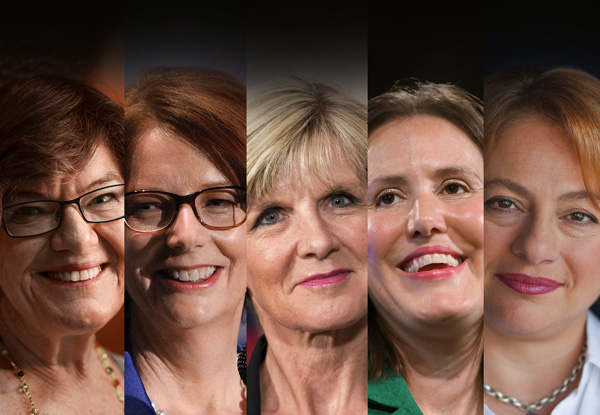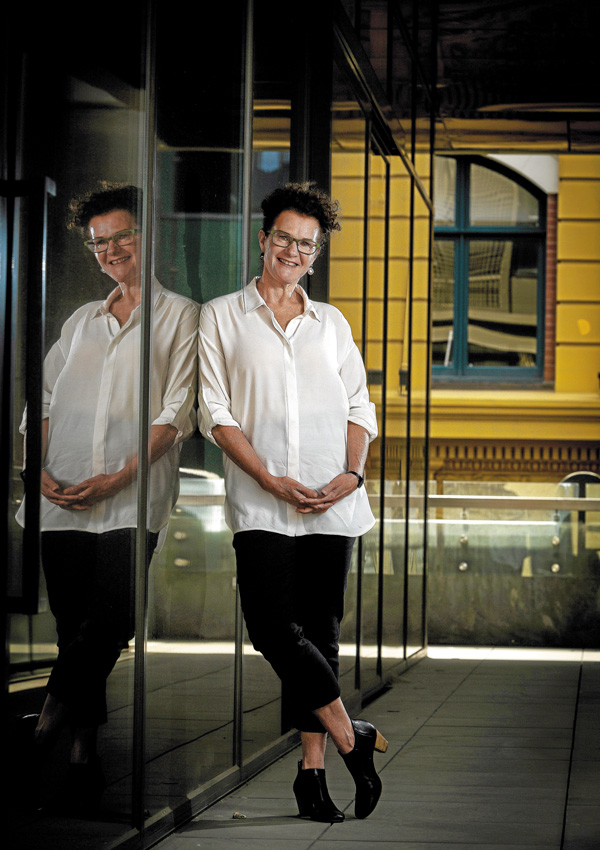A power imbalance
BY GAY ALCORN
Cathy McGowan AO became a politician when she was nearly 60. But the independent member for Indi was hardly a political novice when she won the northeastern Victorian seat in 2013. She had spent much of her adult life in politics of one sort or another, especially as founding member and later president of Women in Agriculture – lobbying, networking, pushing to get things done.
McGowan (DipEd 1976), now 62, has some advice for women thinking seriously about a political career: you’ve got to learn the skills, preferably before you stand as a candidate. And even before that, you’ve got to work out what you really care about.
“The first thing I’d want to say is you’ve got to work out yourself what your platform is,” she says. “There’s not much point unless you’ve got a bit of vision about what you’ve got to say and that takes a lot of work to refine.
“I’m a huge believer in people explaining what the pathway is, because it’s so rarely obvious and it’s not intuitive.”
The University of Melbourne’s Pathways to Politics program is designed to “explain what the pathway is” for women considering a political career. A pilot begins in June, and is a first for an Australian university.
The idea came from philanthropist Carol Schwartz AM, who in turn was inspired by a Harvard Kennedy School program, From Harvard Square to the Oval Office. It offers selected graduates hands-on, practical skills, mentoring and networking. Past speakers include presidential hopeful Hillary Clinton and former Republican governor Christie Todd Whitman.
The aim of Pathways to Politics is simple: increase female representation in local, state and federal politics. The reason is obvious: while the “gender gap” in such areas as education and health has been largely closed in Australia, we are slipping behind other nations in female political representation.
In 2013, a comparison of women in national parliaments ranked Australia 44th (behind countries such as Cuba, Sweden, South Africa, Mexico and New Zealand). We had slipped from 32nd in 2008, and 20th in 2001. In a 2016 study, Australia had fallen to 54th.
There has been slow progress since the first women entered Federal Parliament in 1943. In January this year, the Australian Bureau of Statistics reported that women made up 30.5 per cent of federal parliamentarians. That had risen just 5.5 percentage points since 2001.
Women’s success in state politics varies. As of 2014, about 24 per cent of NSW parliamentarians were women, compared with almost 33 per cent in Victoria and a high of more than 41 per cent in the ACT. A survey of local government councillors in 2011 found that women comprised nearly 28 per cent of elected representatives.
Launching the Pathways to Politics program late last year, Foreign Minister Julie Bishop pointed out the positives. Australia has had a female prime minister, a female governor-general, and now has its first female defence and foreign ministers. Many states, too, have had female leaders. Queensland Premier Annastacia Palaszczuk has a female deputy leader, Jackie Trad, and women make up more than half her cabinet.
“It’s important for women to fulfil these leadership roles because unless others see a woman in that role they don’t imagine that it’s possible,” Bishop said.
The first Pathways to Politics course will be open only to University of Melbourne graduates, although this is expected to change over time, and will be run through the University’s School of Government.
A cohort of 20 to 25 women from all political leanings will receive, free of charge, 12 fortnightly sessions of intensive training and discussion.
At each session, a female politician will speak – off the record – and answer questions over dinner. Then someone with detailed knowledge of the political process – campaigning, polling, speech making and negotiating the media – will speak and give advice.
One of those will be Nicholas Reece (ExecMPubAdmin 2006), Principal Fellow at the University in the School of Government. Reece was formerly a senior adviser to prime minister Julia Gillard (LLB 1986, BA 1989) and was Labor’s campaign director for the 2010 Victorian election.
“There is something systemically that makes it harder for women,” says Reece. “My personal political experience having worked for the first female prime minister was that I saw firsthand the gender lens that was put across a lot of things that she was engaged in.”
Gillard herself famously said when she lost the leadership to Kevin Rudd: “The reaction to being the first female prime minister does not explain everything about my prime ministership, nor does it explain nothing about my prime ministership.”
One of Gillard’s challenges, Reece says, was that female politicians “could be either Margaret Thatcher the Iron Lady or you could be the girl next door, and they were the two archetypes you could choose from as a female politician. That’s just bullshit. There are just as many diverse characters who are women.
“Often there’s an underlying assumption that women shouldn’t consider a career in politics until they have children, or have raised their children. If you follow that logic through, women wouldn’t enter the political system until well into their 40s or 50s, but to get ahead in politics you need to enter a parliamentary role in a relatively early stage in your career so you can do your time and be promoted to senior roles.”
Male-dominated preselection processes also disadvantage women, but they have to learn to push themselves forward, says Reece.
“Women are often not as forward in these things and in a highly competitive area that is full of these overachieving hyper-ambitious types, they can just get pushed out.”
Pathways to Politics is non-partisan, and is looking for women of all ages from any political background. Yet it is undeniable that the conservative side of politics has struggled with this issue more than Labor and the Greens.
“So let this conference declare, by 2025 … 50 per cent of Labor’s representatives will be women,” Labor leader Bill Shorten told the party’s national conference last year. Labor’s affirmative action rules were adopted in 1994 when women comprised just 18.4 per cent of Labor members – it’s now 45 per cent. By comparison, about 22 per cent of Liberal Party MPs are women, and 15 per cent of National MPs.
“I do not believe that (the increase in women MPs) would have happened without the focus that a target provides,” deputy Labor leader Tanya Plibersek told the launch of Pathways to Power. “Because in every individual seat there is always an excuse to preselect the bloke, who’s so exceptional. Or they say ‘I’m a supporter of equality, of course, I believe half our parliamentarians should be women, but in my case in this seat there’s a special reason why that rule shouldn’t apply to me’.”
For the conservative side of politics, the issue is complex. The Liberal Party does not support quotas as a matter of principle, arguing that candidates should be selected only on merit. The party once believed, too, that the number of female MPs would gradually increase over time. But when Tony Abbott’s first Cabinet after the 2013 election included just one woman – Julie Bishop – it was a wake-up call that waiting for things to change was not working.
“We definitely want people who really aspire to entering a political life… and are really committed to political leadership.” – Carol Schwartz
A party report last year recommended setting a 50 per cent target for women in Parliament, and warned that the party risked losing relevance if it did not address the issue. It listed various barriers to women seeking to be candidates in the party, including a “boys’ club” culture and a process designed to “keep outsiders out”. The target would be aspirational, rather than mandatory.
Assistant treasurer Kelly O’Dwyer (LLB(Hons) 1999, BA 2000) has experienced the difficulties of being a female politician firsthand, having last year been advised to express more breast milk for her baby Olivia in order to avoid missing parliamentary business. O’Dwyer does not support mandatory quotas, but she believes targets are needed.
“Those targets can be measured and we will be able to then hold ourselves accountable for our progress in this regard,” O’Dwyer told the ABC recently.
“I think that when you measure something, you achieve better outcomes, and I’d like to think that we can achieve better outcomes.
“I don’t think there’s one silver bullet that’s going to solve this issue. I think we need to put in place a number of strategies in order to encourage women to have the confidence to put up their hand for Parliament, to make sure that they’re supported and set up for success.”
Lillian Kline, the project co-ordinator of Pathways to Politics, says there is “enormous goodwill” around the idea, with most politicians and strategists approached keen to offer their time and expertise.
Schwartz has been involved in promoting women in leadership for many years and is funding the pilot program through her Trawalla Foundation. Although it is modelled on Harvard’s program, this one has a unique element, Schwartz says – a session on political ethics.
“It gets back to that issue that all politicians who enter into politics are really very idealistic,” says Schwartz. “What are the ethics around compromising those beliefs and values in order to sort of toe the line with the party? That might make some people think ‘I actually don’t want to enter politics because I don’t want to do that’, or else ‘how can I negotiate those areas?’
“We definitely want people who really aspire to entering a political life, who aren’t just curious, but actually have read about it, worked in it, and are really committed to political leadership and political life.”
Cathy McGowan loves political life. She is driving home from Canberra when she takes my phone call. The woman she defeated in Indi, Liberal Sophie Mirabella (BCom/LLB 1994, LLM 1998), a former Public Policy Fellow at the University, is standing again at this year’s election, and McGowan is focused on the campaign.
She is well known for her negotiating skills, her ability to network, and for putting people together to achieve things. She says that women who want to be politicians shouldn’t try to ape the way men do things.
“I just think that the blokes have worked out their own pathway, and women have got to work out their own pathway.”
The Australian political system is “really biased against women”, McGowan says. Quotas have worked for Labor, but they might not work for every party.
“You’ve got to actually look at the systemic problems – what’s the barrier and what are you going to do about it?”




